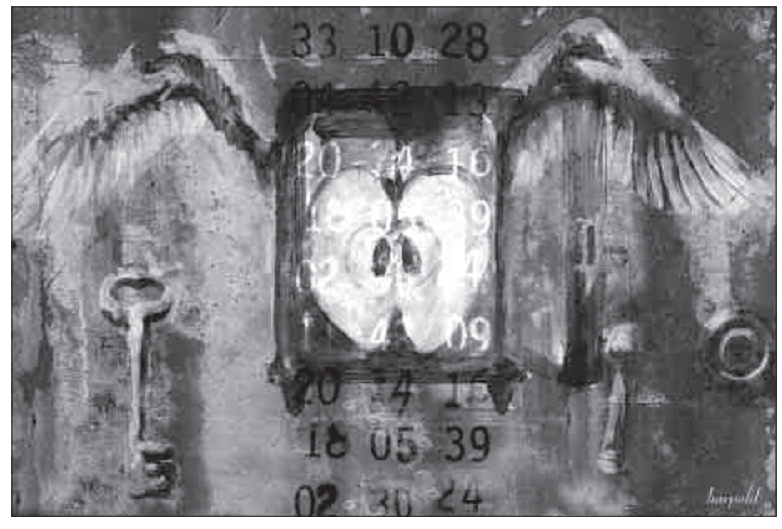How to Run - Unknown Armies (grit, mental health, magick)
Someone on the FKR Collective server asked:
Take the bits from the setting that you like, leave the rest blurry, get an idea of a focused framework for the game, such as:
- A spooky road trip throughout the rust belt
- A descent into a crumbling parallel dimension superimposed onto the lives of the NYC homeless
- A bunch of disgruntled officer workers getting in too deep when they realize their boss is a sorcerer
Once you've agreed on a setting of play (framework), have the players discuss and create PCs together as a conversation. Talk about their strengths and weaknesses, backgrounds, goals, relationships etc.
Take notes.
Use key words rather than sentences when taking notes - keep it evocative but not so detailed as to prevent the players from discovering their characters through play.
Start the game with a bang, or do a cold open, depends on preference. Either way:
Make session 1 a pilot episode - try your hand at what you think you'd like the game to be about, tonally, and see if it sticks. Because it's a pilot, tell the players anything from this sesh can be retconned by them or you afterwards, so that you can jumpstart the game with the wild energy of a one-shot, while building on whatever works to sustain the next games.
For Mechanics, Unknown Armies uses the real life engine as made explicit by various advice on how to handle contests, violence, etc, in the original system. So just use common sense. As usual, a sense of verisimilitude should inform your decision making.
When unable or unwilling to decide, use some dice as an oracle (doesn't matter whether you roll d6 high good low bad, 2d6 with graded results, 1d100 under or equal a % chance you establish when something is attempted or whatever, just do whatever feels good at the table (there's a different feel for different dicing methods, I think we're too quick to try and justify that with math and theory; d12s are underrated and really pleasant to roll, maybe use these this time).
- Disregard uninteresting or unsatisfying rulings.
- Keep using functional rulings.
- Commit excellent rulings (ie: they improve your overall enjoyment and excitment about the game) to memory on paper to build a system that'll organically fit your campaign.
Unknown Armies has "Unsanity"
If you want to play around mental health issues, check to see what your table is comfortable with, dig into your own experiences (everyone has at the very least dealt with depression on some level, right?), and see whether you want to frame it as agency removal (meh, but not because it's disempowering, the disempowerment fits the tone; meh because adventure games/tRPGs are about decision-making) or as a roleplaying prompt (also easier to handle safety wise). These are the two main ways people have been looking at mental health in tRPGs so far that I'm aware of.
I would say you can also simply not treat it as something "aside" and simply a component of a character's psyche just like any other aspect of their life isn't distanced/detached through mechanics.
If they don't have hit points, they don't need sanity points either.
---
Anything that would normally be emphasized through mechanics, such as the way unsanity works in UA 1/2e, reinforce through themes and practical situations for the PCs to interact with instead. Have them make difficult decisions that feel like there's no good answer. Give them opportunities for ambition at the cost of their humanity, yadda yadda. That's the easy part right, you've read the setting info and are flowing with ideas - the application of these ideas and their flavoring is what will make the game "Unknown Armies", not the system or character sheets or what not.
Unknown Armies has Magick
Magick in UA is easy to do freeform since it has clear in-setting metaphysics and rules to follow. An Adept has a taboo, ways to build charges, rotes, and a well-defined paradigm that helps you come up with interesting rituals. You literally have everything you already need there to run magick if you follow the same advice as for the rest: verisimilitude.
It doesn't matter whether you believe in magick IRL or not (I don't, for the record), you can suspend your disbelief enough to operate within its framework for the purpose of adjudicating whether something works or not.
Cohesion and shared expectations about the stuff will grow from a trusting table that regularly communicates openly about how they're experiencing these rulings, so it's fine if there's more negotiation early on, then a phase where most of the time things just go in the flow, and late campaign more negotiation that simply add to the richness of the simulated world cause now everyone has shared expectations and memories/common grounds aobut how stuff works.
Note that these tips work for other stuff than Unknown Armies, but I tried to frame them specifically in relationship to that game. Every now and then I see people ask "how do I run X in an FKR fashion" - the answer is always going to be the same*, though I try to reformulate things regularly to make it more digestible, and to focus on notions that are unique to the experience of playing the given game being FKR'd.
*: frame setting of play, describe characters, start game, come up with rules on the fly through persistent rulings, build the game as you go. Or use an existing framework, just remember that it's a toolkit to invoke when you as a Referee can't provide interesting answers to the players' questions on your own.

Comments
Post a Comment